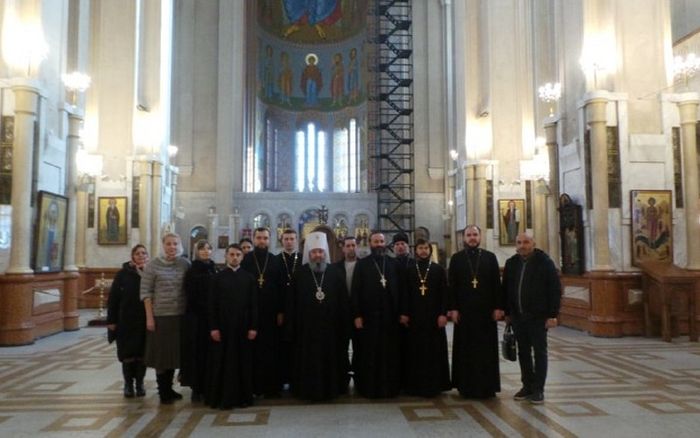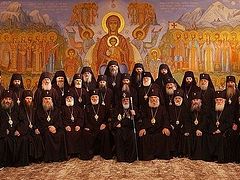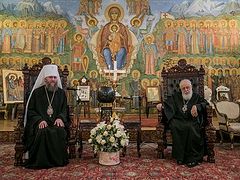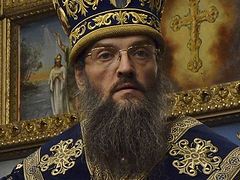Tbilisi, December 26, 2019
 The Ukrainian delegation visiting Holy Trinity Cathedral in Tbilisi. Photo: spzh.news
The Ukrainian delegation visiting Holy Trinity Cathedral in Tbilisi. Photo: spzh.news
A delegation of laity and clergy of the canonical Ukrainian Church, led by His Eminence Metropolitan Vladimir of Volyn, went on pilgrimage to the ancient Orthodox nation of Georgia recently. During the trip, the faithful had the opportunity to venerate a number of the Georgian Church’s sacred shrines and to meet with several Georgian hierarchs.
The delegation from the Volyn Province, the area most affected by the nationalist-schismatics’ church seizures, arrived on December 17, reports the Union of Orthodox Journalists.
On the first day of their visit, the pilgrims visited the Holy Trinity and Zion Cathedrals in Tbilisi, and the Tbilisi Theological Academy, where the rector, Protopresbyter Georgy Zviadadze, warmly received them with words of support for the suffering faithful and clergy.
“I communicated with the primate of the Ukrainian Orthodox Church, His Beatitude Onuphry, when he visited Georgia, and I can attest to his loyalty to the canons of Orthodoxy and his love for the Ukrainian people,” said the rector.
The delegation also visited several other historic churches in Tbilisi, including the Church of St. Alexander Nevsky, where the last elders of the Ukrainian Glinsk Hermitage are buried. Met. Vladimir served a memorial litiya at their graves.
The delegation celebrated the feast of St. Nicholas on December 19 at the ancient Svetitskhoveli Cathedral in Mtskheta, the ancient capital of Georgia. Met. Vladimir was blessed to offer a word of encouragement and prayer to the Georgian faithful.
The pilgrims then met with His Grace Bishop Damian of Samtavisi and Kaspi, the ruling hierarch of one of the 12 ancient sees of the Georgian Orthodox Church, dating to the 5th-6th centuries, who took them on a tour of the local cathedral and monastery.
Discussing the tense situation in world Orthodoxy today, Bp. Damian referred to the words of the Georgian primate: “Our Catholicos-Patriarch Ilia II often warns us against hasty decisions. According to him, to make a mistake, you need little time and effort, but to correct it, you need to make a lot of effort.”
It is known that Pat. Ilia is personally opposed to the Patriarchate of Constantinople’s interference in the internal affairs of the Ukrainian Church, and that he enjoys great respect, love, and influence among the hierarchs, clergy, and faithful of the Georgian Church.
To date, the Georgian Holy Synod has not taken a firm stand on the issue of recognizing the so-called “Orthodox Church of Ukraine.”
The next day, the delegation visited the remote Diocese of Bolnisi, located on the border of Georgia and inhabited today mainly by Muslim Azerbaijanis. His Eminence Archbishop Ephraim showed the pilgrims to an ancient 5th-century church and to the 11th-century Tsughrughasheni Monastery.
Abp. Ephraim noted that the delegation’s visit marks the first visit of a Ukrainian hierarch to the ancient diocese. He also wished the Ukrainian faithful unity, peace, and steadfastness in the faith.
The same day, the Ukrainian delegation also met with the retired Metropolitan Seraphim of Borjomi and Bakuriani, who conveyed words of support for the Ukrainian primate, Met. Onuphry.
“I pray for your primate. At the same time, it should be noted that the majority of our media generally ignore the fact that Ukraine has its own autonomous canonical Church headed by its primate Metropolitan Onuphry of Kiev and all Ukraine,” the hierarch said.
On the other hand, “In the episcopate of the Georgian Orthodox Church, the vast majority of the bishops, along with our Catholicos-Patriarch Ilia II, share my support for the Ukrainian Orthodox Church,” he added.
He also expressed his admiration for Met. Onuphry, whom he considers a man of prayer who gives strength to the Ukrainian Church in these trying times.
“If the authorities try to go to war against the Church, their days will be numbered, and we, the bishops of old age, remember well how this has happened more than once,” Met. Seraphim said, noting that there is obvious pressure on the Georgian Church to recognize the Ukrainian schismatics.
The next day, December 21, the Ukrainian delegation was received by Metropolitan Sergei of Nekresi, who told the clergy and faithful about the development of his diocese and also shared memories of how he himself came to the Orthodox faith.
“My second native land is Ukraine,” the Georgian hierarch said, who spent part of his life in Kharkov. “We know that Ukraine is a spiritual country, and we believe that you will pass the current tests with honor.”
The next day, the final day of the pilgrimage, the delegation visited several monasteries of the Mtskheta and Tbilisi Dioceses and discussed topical Church issues with His Eminence Archbishop Spyridon of Skhaltsk.
“Let your Church be strengthened in your trials, and we will also be strengthened following after you,” the Georgian hierarch said.



